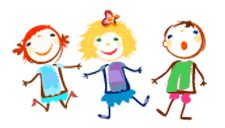
I Infant Cycle Babies

I Infant Cycle Babies
We give special importance to the needs of our needs of our babies, such as their hygiene hygiene routines. Thanks to the low number of students per class, we achieve eye contact and closeness. visual contact and closeness which allows us to attend to them without anticipating or delaying their satisfaction too much, while at the same time taking care of the emotional affective relationship with the child: caressing him/her, talking to him/her...
EVOLUTIONARY DEVELOPMENT IN THE FIRST YEAR OF LIFE
At this stage body language will be their first languageThey will express their needs through gestures, attitudes and visual contacts that will provoke reactions in their environment, thus creating an affective exchange with others. They will begin to recognize familiar faces and will react by crying in front of strangers. These reactions will also be reflected in the body, through muscle tone and tension.
In the first year, biological self-preservation biological functions of self-preservation stand out: sucking, sucking and biting will be the will be their activities as a way of exploring the world around them.
This moment constitutes a basic stage to educate and enjoy the body; it is the so-called "sleep stage" in which, especially from 4 months onwards (when babies are incorporated into the center), it will be the movement, the displacement in space, which will help them to advance in their development.
You will discover the flip (the ability to turn over on his own, going from face-up to face-down and vice versa). The tone of his neck muscles will become stronger, as well as his buttocks and lower back muscles. This is aimed at allowing him to sitting (initially with support, to move on to sitting up unaided).
The seating will allow you to improve manipulation hands; and sight and hearing will gradually take the place of the mouth as a means of exploring the characteristics of things. His senses will mature with experience experiences and will be discovering parts of his body: hands, feet...
After turning and sitting down, you will discover the possibility of "crawlingfirst in a circular motion (turning on the abdomen) and then crawling.
Around the last trimester, you will be introduced to crawling. crawlingcrawling, to end in standing around the age of one year.
Taking into account all these circumstances, the activity in the center will be flexible to attend initially to each of the babies and their activities will be related to their own body movement. activities will be related to the movement of their own body and experimentation with the and experimentation with the elements of the environment.

We give special importance to the needs of our needs of our babies, such as their hygiene hygiene routines. Thanks to the low number of students per class, we achieve eye contact and closeness. visual contact and closeness which allows us to attend to them without anticipating or delaying their satisfaction too much, while at the same time taking care of the emotional affective relationship with the child: caressing him/her, talking to him/her...
EVOLUTIONARY DEVELOPMENT IN THE FIRST YEAR OF LIFE
At this stage body language will be their first languageThey will express their needs through gestures, attitudes and visual contacts that will provoke reactions in their environment, thus creating an affective exchange with others. They will begin to recognize familiar faces and will react by crying in front of strangers. These reactions will also be reflected in the body, through muscle tone and tension.
In the first year, biological self-preservation biological functions of self-preservation stand out: sucking, sucking and biting will be the will be their activities as a way of exploring the world around them.
This moment constitutes a basic stage to educate and enjoy the body; it is the so-called "sleep stage" in which, especially from 4 months onwards (when babies are incorporated into the center), it will be the movement, the displacement in space, which will help them to advance in their development.
You will discover the flip (the ability to turn over on his own, going from face-up to face-down and vice versa). The tone of his neck muscles will become stronger, as well as his buttocks and lower back muscles. This is aimed at allowing him to sitting (initially with support, to move on to sitting up unaided).
The seating will allow you to improve manipulation hands; and sight and hearing will gradually take the place of the mouth as a means of exploring the characteristics of things. His senses will mature with experience experiences and will be discovering parts of his body: hands, feet...
After turning and sitting down, you will discover the possibility of "crawlingfirst in a circular motion (turning on the abdomen) and then crawling.
Around the last trimester, you will be introduced to crawling. crawlingcrawling, to end in standing around the age of one year.

Taking into account all these circumstances, the activity in the center will be flexible to attend initially to each of the babies and their activities will be related to their own body movement. activities will be related to the movement of their own body and experimentation with the and experimentation with the elements of the environment.
Classrooms
Food and rest
Every day the students take a report home detailing how the student has performed the basic processes, such as: eating, napping...
My backpack
What do I need to bring to school?
At the beginning of the course:
- 5 T-shirt collar bibs
- Package of diapers
- Pack of wipes
In the backpack:
- Complete change
- Babi (Change)
- Water bottle
- Pacifier (if used)
- Doll or sleep aid (if used)
If it has been necessary to change the student, the backpack will be returned on Friday.
On Wednesday the soiled bib will be turned in and replaced with the one in the backpack.
Diapers and wipes will be replenished when the tutor needs them, always taking into account that they will be replenished one week in advance.
The bibs will remain at the center and will be washed every day in our laundry, at the end of the school year they will be discarded.
I'm sick: What do we do?
- When a student becomes ill at school, parents will be notified immediately. If he/she has a signed authorization for the antipyretic medicine, he/she may be given the medicine before they arrive to pick him/her up.
- He/she will not be able to return to school until he/she has been fever free and without medication for 24 hours. This protects the student's well being at school and avoids contagion to the rest of the classmates.
- No medication will be administered without the corresponding medical prescription.
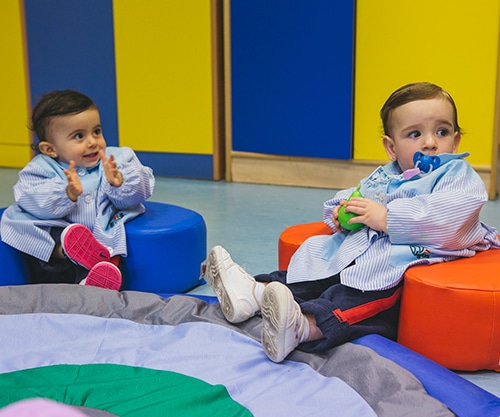
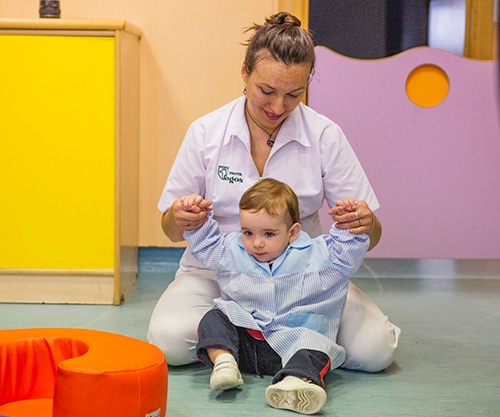
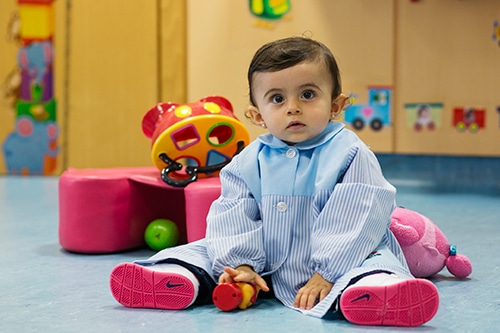
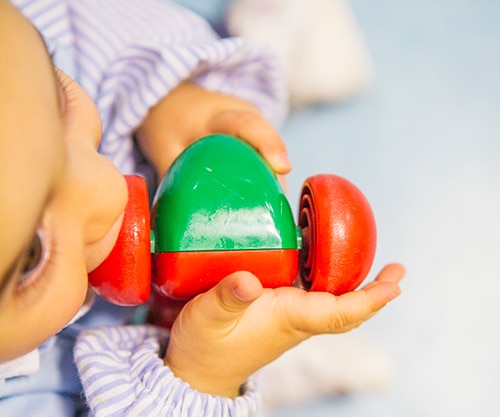
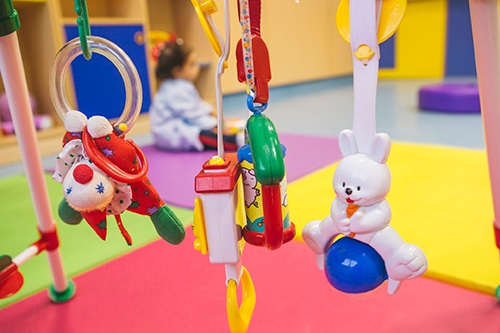
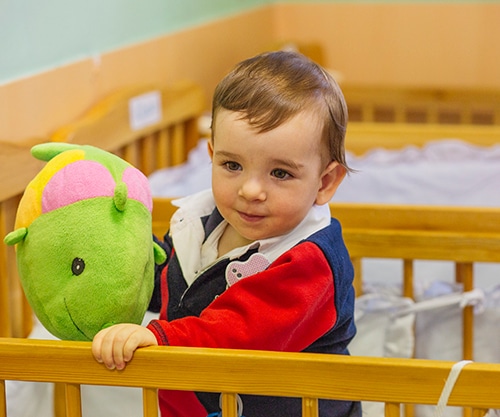
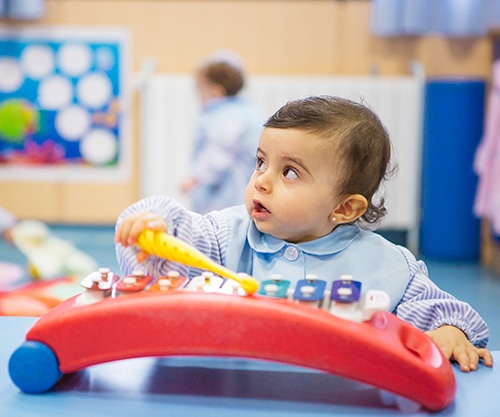
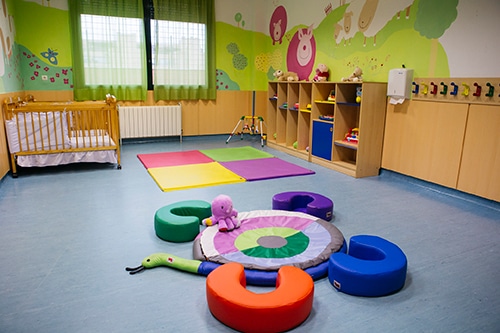
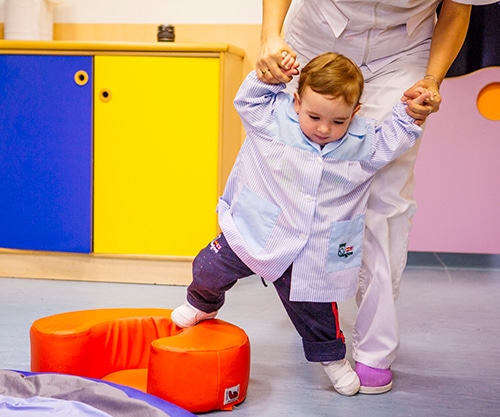
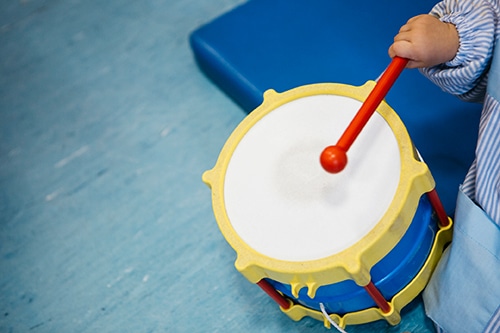
Classrooms
Food and rest
Every day the students take a report home detailing how the student has performed the basic processes, such as: eating, napping...
English
My backpack
At the beginning of the course:
- 5 T-shirt collar bibs
- Package of diapers
- Pack of wipes
In the backpack:
- Complete change
- Baby (Change)
- Water bottle
- Pacifier (if used)
- Doll or sleep aid (if used)
If it has been necessary to change the student, the backpack will be returned on Friday.
On Wednesday the soiled baby will be turned in and replaced by the one in the backpack.
Diapers and wipes will be replenished when the tutor needs them, always taking into account that they will be replenished one week in advance.
The bibs will remain at the center and will be washed every day in our laundry, at the end of the school year they will be discarded.
I'm sick: What do we do?
- When a student becomes ill at school, parents will be notified immediately. If he/she has a signed authorization for the antipyretic medicine, he/she may be given the medicine before they arrive to pick him/her up.
- He/she will not be able to return to school until he/she has been fever free and without medication for 24 hours. This protects the student's well being at school and avoids contagion to the rest of the classmates.
- No medication will be administered without the corresponding medical prescription.










Discover our Nursery Stages

